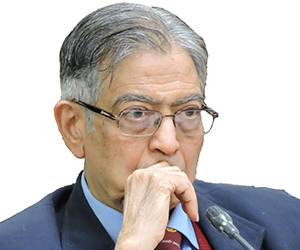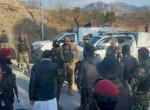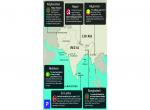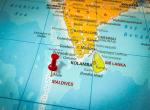Manmohan Singh is taking huge risks in appeasing Pakistan in the hope that it will lead to a thaw in bilateral relations and mould his stature as a ‘statesman'. But his gestures have been disproportionate to the existing ground realities. He is offering Pakistan far too many concessions while overlooking India’s national interest
The outcome of the interaction between the Indian and Pakistani Prime Ministers in the Maldives bears testimony as much to the UPA Government’s continued mendacity vis-a-vis the nation on India-Pakistan relations as to its compulsive pusillanimity in its dealings with Pakistan.
Mr Manmohan Singh would have us believe from his statement to the media in the Maldives following his meeting with Mr Gilani that the India-Pakistan dialogue process has “yielded some positive results.” This is palpably false as Pakistan has neither brought to book the perpetrators of the November 2008 Mumbai attacks nor shut down the infrastructure of terror. Indeed, security agencies report that there are 2,500 militants in Pakistan-occupied Kashmir poised for infiltration into Jammu & Kashmir and covering fire by Pakistan has been provided from time to time to facilitate the same.
Far from the dialogue process having yielded “positive results” it is having a negative fall out. For instance, on the eve of the Prime Ministerial level discussions, Pakistan took the Jamaat-ud-Dawa’h off its terror list and rubbished the evidence provided by India linking Hafiz Saeed to the Mumbai attack. In the light of the overwhelming evidence of Pakistan’s continued sponsorship of terrorism against India, Mr Singh’s claim that his approach to Pakistan is to “trust but verify” is utterly meaningless.
It may also be mentioned that the wide-ranging India-Pakistan dialogue is in clear contradiction to Manmohan Singh’s assurances to the nation against holding such talks until Pakistan provided India with satisfaction on terrorism. In this context, one need only recall his statement in Parliament on July 29, 2009 that “Pakistan has to act and act effectively on terrorism before there can be a comprehensive dialogue covering all areas of disagreement or concerns of the two countries”.
While deliberately misleading the nation is the standing operating procedure of the UPA Government, the dialogue process, more importantly, underlines that the Government does not intend to penalise Pakistan in any way for its involvement with terrorist activities directed against India. The stern statements made by the Prime Minister on this score in Parliament were only rhetoric, merely for show and not to be taken seriously.
Though Pakistan has consistently given us cause for anxiety, whether on account of terrorism or its machinations in collusion with China such as their joint exercises on the Rajasthan border, we, far from taking any punitive measure, have gone out of our way in providing comfort to it at a time when its relationship with its most important partner — the US — is under stress. Some of the important moves made by us on this account are as follows:
Decision to resume the dialogue process with Pakistan rather than demand it be branded as a terrorist state. This has prevented its isolation and encouraged it to persist with the export terror to India in a business as usual mode;
Move to support Pakistan’s membership to the Security Council even though it vigorously opposes our own quest for a permanent seat thereon. Since Pakistan was elected by the thinnest of margins our support was critical;
Support European Union decision to provide duty-free access to Pakistani textile exports even though this will adversely affect our own textile exports. The opposition of our Union Ministry of Commerce to the European Union move was reversed at the express intervention of the PMO;
Conclusion of a visa agreement, which awaits signature, significantly easing travel restrictions between the two countries which will signal that we are not overly concerned about Pakistan’s use of terrorism as an instrument of foreign policy against us.
The argument that there is a change of heart in Pakistan as it is moving towards giving us the ‘most favoured nation’ status holds no water as we had accorded Pakistan MFN status over 15 years ago. By reciprocating this gesture Pakistan is doing us no great favour. On the contrary, by not according MFN status to India, Pakistan has been hurting itself all these years as it deprives itself of Indian goods which are available at lower prices than comparative goods from elsewhere and to the extent that such goods are smuggled into the country it loses revenues.
Finally, one is apprehensive that the Prime Minister is on the verge of making some additional magnanimous gestures to Pakistan to the detriment of the national interest arising from his assertion that the next round of talks should be “far more productive”. This, together with hints of the Prime Minister visiting Pakistan may well point to deals on issues like Siachen and Sir Creek.
Since Pakistan is unlikely to make any compromises an Indian sellout under the Manmohan Singh dispensation may well be on the cards. This is all the more so as the Prime Minister has anointed Mr Gilani as a “man of peace” and as he feels that the time has come to write a “new chapter” in India-Pakistan relations. Pakistani leaders appear to have a transformative effect on our professorial Prime Minister who, after meeting then Pakistani President General Pervez Musharraf in New York in September 2004, had similarly expressed confidence that the two would write a new chapter in India-Pakistan history. Could this transformative urge be inspired by the hope of garnering the Nobel Prize?
-------------------------------------------------------------
Published in The Pioneer : 15th November - 2011










Post new comment